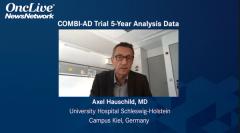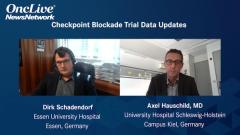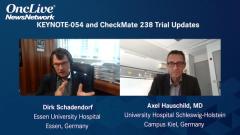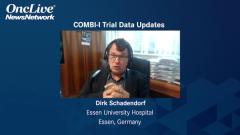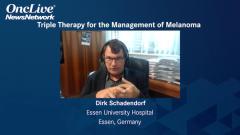
COMBI-i Trial Data Updates
Episodes in this series

Transcript:
Axel Hauschild, MD:As the older chairman of the 2 of us, I’d like to switch now to COMBI-i trial and the triplet regimen that has been used. For me, the presentation of the press release was a big disappointment. How do you feel about the results of the triplet, which was spartalizumab—a PD-1 [programmed death-1] antibody—dabrafenib, and trametinib and the idea behind it?
Dirk Schadendorf, MD:We have heard about the rationale that we are trying to combine all the goods of both worlds to be in paradise, so having quick, deep responses and making them durable and long-lasting in the majority of our patients. That was the concept. There were also some animal models in brackets. You always find animal models that support your rationale because you are not counting all the animal models that are not supporting your model. You have all that together, and it was a big disappointment for the entire community to see that the TRILOGY IMspire150 trial and also the COMBI-i trial, giving up-front, targeted therapy and checkpoint inhibition, did not increase response rate. The effect on PFS [progression-free survival] is marginal, and whether this will translate into any survival benefit is highly questionable in the way that the studies were done. In parallel, you are increasing toxicity substantially, so it brings us back to square 1—rethinking what and how it should be used, what we have achieved over the last 10 years with targeted therapies and a checkpoint blockade, and how we use it best for our patients.
Axel Hauschild, MD:Yes. We need to mention, Dirk, that in the COMBI-i trial the end point was progression-free survival, and the progression-free survival for the triplet was 16 months compared with 12 months—not unexpected for dabrafenib-trametinib—so there is a difference of 4 months. It was almost statistically significant. But in the end it was not statistically significant, and therefore it was considered a negative trial. Do you expect with longer follow-up time that this can change?
Dirk Schadendorf, MD:No, but it’s interesting that the positive trial, the TRILOGY IMspire150 trial, which led to a registration of the triplet in the United States, has only 2 weeks longer PFS. It’s 4.2 or 4.3 months difference in PFS, so you see how close and small differences in statistical design will determine whether a drug combination at the end will be approved. But I don’t see that the median PFS with prolonged follow-up will change. I think this is caught by the primary end point of the study. This is not true here, so this study will stay a negative. The only thing what we can do is try to learn from negative results in terms of what patient groups seemed to do better. That’s an important thing to discuss. Is there a role of triplet therapy at all for our patients?
Transcript Edited for Clarity


